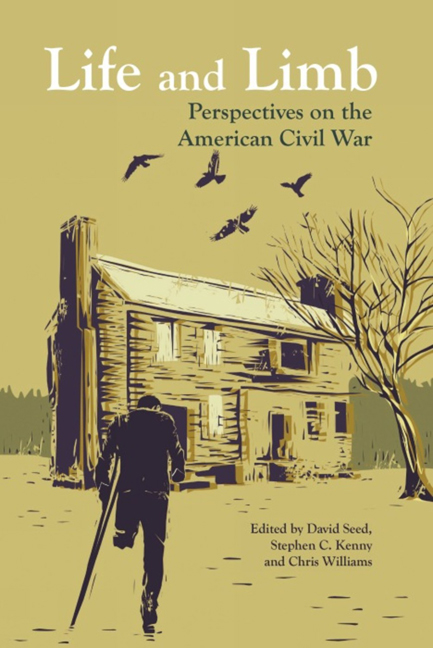Book contents
- Frontmatter
- Contents
- List of Illustrations
- Acknowledgements
- Introduction: Civil War Voices and Views
- MEDICAL AND SURGICAL MEMOIRS
- ACCOUNTS OF NURSING
- With the US Sanitary Commission: On the Hospital Boat Wilson Small: The Other Side of War
- Evacuation from Virginia, 1862: Hospital Transports
- Hospital Routine
- A Death in the Ward: Hospital Sketches
- Nurse and Spy: Nurse and Spy in the Union Army
- Front-line Nursing: Reminiscences of My Life in Camp
- ‘The Mute Look that Rolls and Moves’: Walt Whitman's Civil War
- Specimen Days & Collect
- MEDICAL FACILITIES AND PATHOLOGY
- PHOTOGRAPHY
- AMPUTATIONS AND PROSTHETIC LIMBS
- IN THE FIELD OF BATTLE
- POST-WAR NARRATIVES
- Contributors
- Select Bibliography
- Index
- Plates
A Death in the Ward: Hospital Sketches
from ACCOUNTS OF NURSING
- Frontmatter
- Contents
- List of Illustrations
- Acknowledgements
- Introduction: Civil War Voices and Views
- MEDICAL AND SURGICAL MEMOIRS
- ACCOUNTS OF NURSING
- With the US Sanitary Commission: On the Hospital Boat Wilson Small: The Other Side of War
- Evacuation from Virginia, 1862: Hospital Transports
- Hospital Routine
- A Death in the Ward: Hospital Sketches
- Nurse and Spy: Nurse and Spy in the Union Army
- Front-line Nursing: Reminiscences of My Life in Camp
- ‘The Mute Look that Rolls and Moves’: Walt Whitman's Civil War
- Specimen Days & Collect
- MEDICAL FACILITIES AND PATHOLOGY
- PHOTOGRAPHY
- AMPUTATIONS AND PROSTHETIC LIMBS
- IN THE FIELD OF BATTLE
- POST-WAR NARRATIVES
- Contributors
- Select Bibliography
- Index
- Plates
Summary
Louisa May Alcott (1832–1888) was a member of a famous reformist family and was beginning to establish herself as a writer when war broke out. The number of female nurses increased during 1862 under the direction of Dorothea Dix, a family friend of the Alcotts. Alcott herself served in the Georgetown Union Hotel Hospital, just outside Washington, DC, from December 1862 to January 1863, when she fell ill with typhoid pneumonia and was invalided out of the service.
Alcott's Hospital Sketches was first published in the abolitionist journal Boston Commonwealth from May to June 1863, and was published in book form in 1863 (Boston: James Redpath). Five cents from every copy sold was donated by the publisher to orphans made fatherless or homeless by the war. In her postscript, Alcott criticized the casual disposal of the dead, the callous attitude of some doctors, and also declared: ‘Since the appearance of these hasty Sketches, I have heard from several of my comrades at the Hospital; and their approval assures me that I have not let sympathy and fancy run away with me, as that lively team is apt to do when harnessed to a pen,’ concluding: ‘[T]he next hospital I enter will, I hope, be one for the colored regiments, as they seem to be proving their right to the admiration and kind offices of their white relations, who owe them so large a debt, a little part of which I shall be so proud to pay.’
Alcott narrated her sketches through the persona of Tribulation Periwinkle, who declares her commitment to service in the opening line: ‘I want something to do.’ The later edition of the book, Hospital Sketches and Camp and Fireside Stories (Boston: Roberts Brothers, 1869), carried the famous frontispiece reproduced in this volume (see Plate 2). The image shows a hospital scene presided over by a portrait of Lincoln, headed by the motto ‘In God We Trust’ (which first appeared on coins in 1864), uniting the union cause with Christianity. The patient's eyes are raised (in piety?), the nurse's solicitously directed on the patient.
Alcott's account of the death of Virginia blacksmith John Suhre (in the following excerpt from the sketch ‘A Night’) contrasts with most other excerpts selected here in its detailed account of his stoical piety, which Alcott uses polemically against the casual treatment of war casualties she witnessed in the hospital.
- Type
- Chapter
- Information
- Life and LimbPerspectives on the American Civil War, pp. 26 - 32Publisher: Liverpool University PressPrint publication year: 2015



